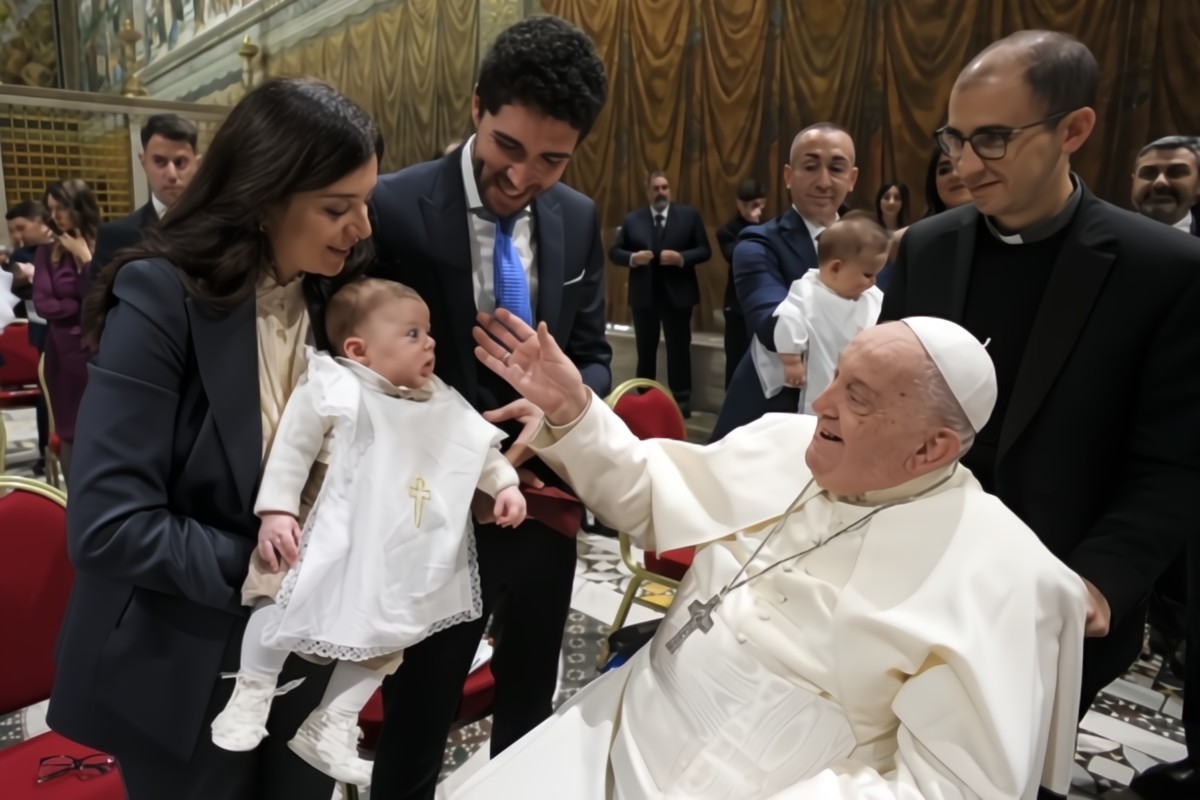We ask you, urgently: don’t scroll past this
Dear readers, Catholic Online was de-platformed by Shopify for our pro-life beliefs. They shut down our Catholic Online, Catholic Online School, Prayer Candles, and Catholic Online Learning Resources—essential faith tools serving over 1.4 million students and millions of families worldwide. Our founders, now in their 70's, just gave their entire life savings to protect this mission. But fewer than 2% of readers donate. If everyone gave just $5, the cost of a coffee, we could rebuild stronger and keep Catholic education free for all. Stand with us in faith. Thank you.Help Now >
Pope: Learn from Paul VI to Love of the Church
FREE Catholic Classes
Pope Benedict XVI affirmed that the whole Church should learn from Pope Paul VI how to love the Church.
Highlights
BRESCIA, Italy (Zenit.org) - Pope Paul VI was a great lover of the Church, says Benedict XVI, and he dedicated all his energies to serving it, so that in the Church, contemporary man finds Christ.
The Pope said this Sunday when he reflected on Paul VI during a visit to the Italian Pontiff's birthplace for a one-day apostolic journey.
Benedict XVI celebrated Mass in the Piazza Paul VI, drawing lessons presented by the two widows spoken of in today's liturgy.
"Jesus tells us to pay attention [to the widow] just as he told his disciples to on that day," the Pontiff said. "Pay careful attention to what the widow does, because her gesture contains a great teaching; it, in fact, expresses the fundamental characteristic of those who are the 'living stones' of the new Temple: the complete gift of self to the Lord and our neighbor; the widow of the Gospel, like the widow in the Old Testament [cf. 1 Kings 17:10-17], gives everything, she gives herself, and she puts herself in the hands of God for others.
"This is the perennial meaning of the poor widow's offering, which Jesus commends because she gave more than the rich, who offer a part of their surplus, while she gave everything she had to live, and thus gave herself."
Evangelical icon
The German Pontiff said he would use this "evangelical icon" to meditate on the "mystery of the Church, the Temple of the living God, and in this way pay homage to the memory of the great Pope Paul VI, who dedicated his whole life to the Church."
Benedict XVI cited some thoughts from his predecessor's "A Thought About Death."
"Let us re-read the concluding part of his 'Pensiero alla Morte,' where he speaks about the Church," Benedict XVI proposed. "'I could say,' he writes, 'that I always loved her ... and that for her, and for no one else, I think I have lived.'"
The Pope said these are "the accents of a palpitating heart," and he continued to quote: "'Finally I would like to comprehend her entirely, in her history, in her divine plan, in her final destiny, in her complex, total and unitary composition, in her human and imperfect consistency, in her disasters and her sufferings, in her weaknesses and in the misery of so many of her children, in her less pleasing aspects, and in her perennial effort at fidelity, love, perfection and charity.'
"'Mystical Body of Christ. I want,' the Pope continues, 'to embrace her, to greet her, love her, in every being that constitutes her, in every bishop and priest who assists and guides her, in every soul that lives her and exemplifies her; to bless her.'
"And the last words are for her as for a life-long bride: 'And to the Church, to whom I owe everything and who was mine, what will I say? May God's blessings be upon you; be conscious of your nature and your mission; have a sense of the true and deep needs of humanity; and journey in poverty, that is free, strong and loving toward Christ poor.'"
Poor and free
The Holy Father said Paul VI's description of the Church contain a lesson for today.
"What can one add to such lofty and intense words?" he asked. "I would just like to stress this last vision of the Church as 'poor and free,' which recalls the evangelical figure of the widow."
Benedict said the ecclesial community must be this way "to reassure and speak to contemporary humanity."
"Giovanni Battista Montini had the Church's encounter and dialogue with the humanity of our time at heart in every season of his life, from the first years of priesthood to the pontificate," he said. "He dedicated all of his energies to the service of a Church that would be as much as possible in conformity with her Lord Jesus Christ so that, encountering her, contemporary man could encounter him, Christ, because he has absolute need of Christ."
Consciousness, renewal, dialogue
The German Pontiff suggested that this was the fundamental aim of the Vatican Council called by Paul VI and expounded in his 1964 encyclical, "Ecclesiam Suam."
With this first encyclical, the Holy Father explained, Paul VI proposed to explain the importance of the Church for the salvation of humanity.
Three words key to Paul's thinking about the Church at the beginning of his papacy were "consciousness," "renewal," and dialogue," he noted.
"First of all the demand that she deepen her consciousness of herself: her origin, nature, mission, final destiny; secondly, her need to renew and purify herself, looking to the model of Christ; finally the problem of her relationship to the modern world," Benedict XVI said.
These same three issues "remain absolutely central today," he contended. Echoing Paul VI, the Pope affirmed that the Church cannot engage the world without fostering a deep interior life: "Precisely the Christian open to the world, the Church open to the world, have need of a robust interior life."
A word for priests
Benedict XVI affirmed that the whole Church should learn from Paul VI, but given the Year for Priests under way, he emphasized a particular lesson for priests, drawing from "Sacerdotalis Caelibatus."
"In his encyclical on priestly celibacy [Paul VI] wrote: 'Laid hold of by Christ unto the complete abandonment of one's entire self to him, the priest takes on a closer likeness to Christ, even in the love with which the eternal Priest has loved the Church his Body and offered himself entirely for her sake, in order to make her a glorious, holy and immaculate Spouse. The consecrated celibacy of the sacred ministers actually manifests the virginal love of Christ for the Church, and the virginal and supernatural fecundity of this marriage.'"
The Bishop of Rome concluded with an observation for the laity: "In the Insegnamenti of Paul VI, dear friends of Brescia, you will find always valuable indications about how to deal with the present challenges such as, above all, the economic crisis, immigration, and the education of the young."
Join the Movement
When you sign up below, you don't just join an email list - you're joining an entire movement for Free world class Catholic education.

-

-
Mysteries of the Rosary
-
St. Faustina Kowalska
-
Litany of the Blessed Virgin Mary
-
Saint of the Day for Wednesday, Oct 4th, 2023
-
Popular Saints
-
St. Francis of Assisi
-
Bible
-
Female / Women Saints
-
7 Morning Prayers you need to get your day started with God
-
Litany of the Blessed Virgin Mary
Introducing 'Journey with the Messiah' - A Revolutionary Way to Experience the Bible
-

9 Harmful Practices to Avoid When Confronting the Devil
-

Pope Francis Celebrates the Feast of the Baptism of the Lord with Special Emphasis on the Gift of Faith
-
New Respiratory Virus Spreads Across China: Is it a Threat to the Global Community?
-
Resurgent Nuclear Threats and the Call for Peace
Daily Catholic
 Daily Readings for Tuesday, January 14, 2025
Daily Readings for Tuesday, January 14, 2025 St. Felix of Nola: Saint of the Day for Tuesday, January 14, 2025
St. Felix of Nola: Saint of the Day for Tuesday, January 14, 2025 Prayer for a Blessing on the New Year: Prayer of the Day for Tuesday, December 31, 2024
Prayer for a Blessing on the New Year: Prayer of the Day for Tuesday, December 31, 2024- Daily Readings for Monday, January 13, 2025
- St. Hilary of Poitiers: Saint of the Day for Monday, January 13, 2025
- St. Theresa of the Child Jesus: Prayer of the Day for Monday, December 30, 2024
![]()
Copyright 2024 Catholic Online. All materials contained on this site, whether written, audible or visual are the exclusive property of Catholic Online and are protected under U.S. and International copyright laws, © Copyright 2024 Catholic Online. Any unauthorized use, without prior written consent of Catholic Online is strictly forbidden and prohibited.
Catholic Online is a Project of Your Catholic Voice Foundation, a Not-for-Profit Corporation. Your Catholic Voice Foundation has been granted a recognition of tax exemption under Section 501(c)(3) of the Internal Revenue Code. Federal Tax Identification Number: 81-0596847. Your gift is tax-deductible as allowed by law.







 Daily Readings for Tuesday, January 14, 2025
Daily Readings for Tuesday, January 14, 2025 St. Felix of Nola: Saint of the Day for Tuesday, January 14, 2025
St. Felix of Nola: Saint of the Day for Tuesday, January 14, 2025 Prayer for a Blessing on the New Year: Prayer of the Day for Tuesday, December 31, 2024
Prayer for a Blessing on the New Year: Prayer of the Day for Tuesday, December 31, 2024


